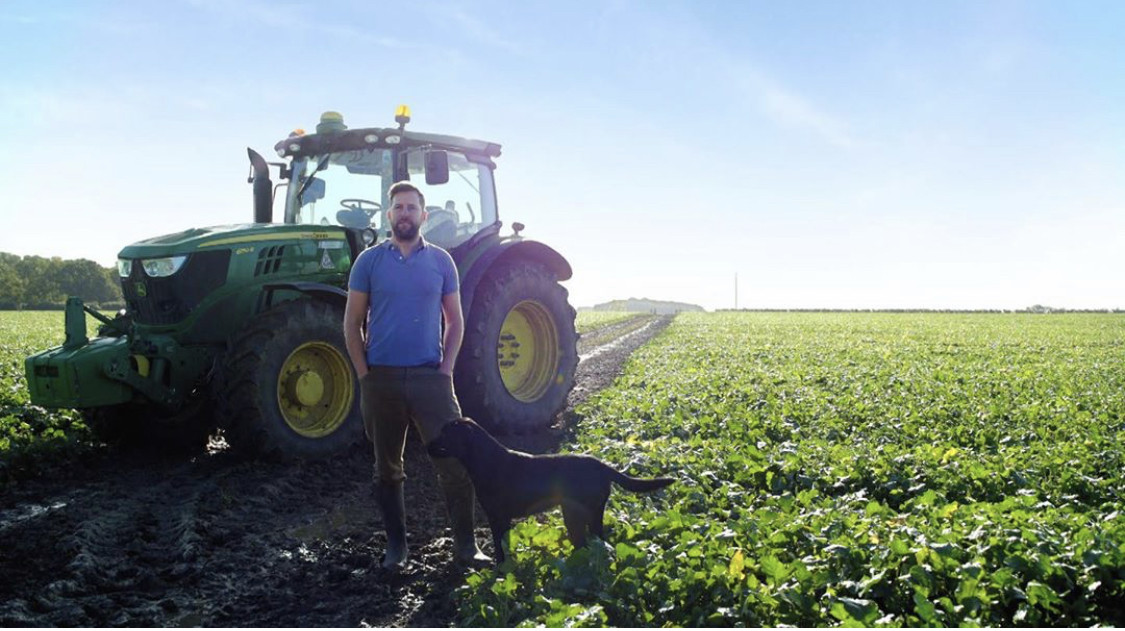AF Changemaker: Time for changes with G Martin & Sons
19 May 2023
I am Tom Martin of G Martin & Sons.
We farm just west of Peterborough. We have a medium sized family farm, largely arable, a little bit of grass, a few sheep and my uncle has some cattle on the grassland. Very much an integrated, mixed family farm. We are regenerative, and now cool, apparently, and I like to share what we do with as many people as possible.
We adopted the five principles or pillars of regenerative farming, each with their own benefits. A wide crop rotation, leaving roots in the ground (which is basically using cover cropping and intercropping) integrating livestock, protecting the soil surface and reducing tillage.
They talk about the top six inches being the most important thing in farming and some people think that's the soil. But actually, it's the thinking, the brain. The reason I came back to farming was because in my previous roles I just wasn't learning anything. And in our farming, I definitely haven't stopped learning.
We're all here to make a difference. And that's what really fires me.
This is the fourth industry I've worked in. When I came back to farming seven years ago, half the people I spoke to said “what a bloody awful time to come in”. And the other half would say, “what a bloody great time to come into farming” and I agree with the latter. It is an amazing time to be in farming. The pace of change has never been so great.
In every other industry, I've spent time in marketing meetings (even though I've never worked in marketing) and discussed our products, how we can promote sales and how we can increase our share of the market.
We're at a time in history where people have never known less about where their food comes from and yet never been more interested. That's my, our, opportunity.
Farmertime (when a farmer goes online with a class of school children to answer their questions) started on this farm. We now have about 28,000 children around the UK who are part of the project linking farms with schools. It’s also running in six other countries.
Another thing we do is The Farming Year. It came out of Open Farm Sunday, amazing but it's just one day of the year, and I find a lot of people want to come through the gate with me. Eight times a year we sell tickets and we give up to fifty people the chance to go for a walk with me on a Saturday morning.
We started the Community Garden. We have about 15 families who pool their veg budget to employ a gardener one day a week. Kids and adults all get involved and I'm going to look at how many people we need to be involved to have a veg gardener five days a week.
Anything I get excited about, I feel like other people should be excited about as well. I'm an evangelist for anything we do, whether it's our Community Garden, or Farmertime, or our regenerative farming. I want to share it with other people, helping them to understand why they should be proud to buy British produce.
Soil indices are changing. The soil ‘walks’ better. We've recorded more wildlife. There's less flooding.As well as the factual and business side of things there's the emotional side of things as well. A key performance indicator for me is how I feel about the farming I do. I’m happy and that's really important.
Frankly, being able to use AF takes a weight off my mind. Done.We have a bookkeeper who comes in once a month and AF billing suits her. What makes her life easier makes my life easier!I used to work for General Electric. In that kind of business, you're aiming for excellence, you're really quite forensic about your costs. You outsource things that aren't your core competencies. My uncle recommended AF and we joined up to source our inputs.
As farmers we spend a lot of time thinking “how much I'm going to sell that wheat for?”. That's all very well. But, if we're really forensic about our prospects, we can probably have a greater influence on our profits by reducing our costs.
I had a trip of a lifetime last January, to the US to a couple of conferences. That was amazing. It made me want it to be a relatively frequent thing, to go and fill my tank with amazing inspiration.
For this farm, I'm just starting to put together a vision for 2030. I’m hoping to go into renewable energy with solar. We're in the middle of a climate crisis and you know the old cliché that says “if you're not moving forward yet, you know you're going backwards”.
We’re looking again at what we're producing: meat and grains. Do we need to be looking at having a more integrated system introducing different cropping where we can produce fruit, veg, potentially nuts and other produce?Reducing our inputs. That's another really, really, key thing. Challenging all our purchasing decisions.
Another one of my goals is by 2025 to have 100,000 children in the UK linked with a farmer through Farmertime and 100,000 around the world. If there’s about 25 in a class, that means we need 4000 farmers to step up and spend an hour or so connected to a classroom of young minds and have some great conversations.
We always moan that politicians don't understand British farming. But my dream that is that the farmers of tomorrow won't say that their politicians don’t understand because, as children, those decision-makers will have been through Farmertime and they'll have met a farmer and they'll understand what we do.
To find our more about Farmertime, visit: https://www.farmertime.uk/